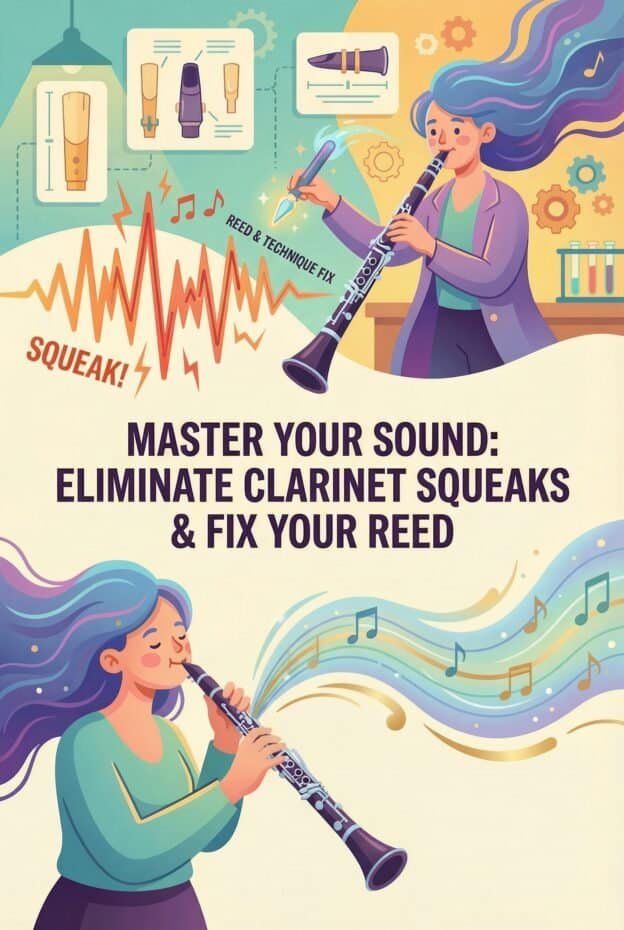How do I stop my clarinet from squeaking? To stop clarinet squeaks, first inspect and reseat or replace the reed, checking for chips, cracks, or warping. Then check mouthpiece alignment and ligature tension, confirm that pads and keys seal using simple leak tests, relax and correct embouchure and air support, clean and assemble the instrument carefully, and consult a repair technician if squeaks persist.
Quick overview: why clarinets squeak
Clarinet squeaks happen when the reed, air, and instrument stop vibrating in a stable way and suddenly jump to another pitch or noise. The cause is usually a problem with the reed, a small air leak, or embouchure and tongue movement that interrupts the vibration. The good news is that most squeaks are fixable with simple checks.
On a clarinet, the single reed sits on the mouthpiece and vibrates when you blow. If the reed is damaged, too dry, too hard, or too soft, it can respond unpredictably and squeak. Even a tiny chip at the tip or a warped table can make the reed catch and then release with a high, sudden sound.
Instrument anatomy also matters. The clarinet body has tone holes covered by pads on keys. If a pad does not seal a tone hole, especially near the register key or throat tones, air leaks out and the note can split. Poor assembly, loose tenons, or bent keys can all create leaks that lead to squeaks.
Technique plays a major role. An embouchure that bites, collapses, or shifts, or air that is weak or uneven, can force the reed into unstable motion. Tonguing that is too heavy, too low on the reed, or combined with jaw movement can also trigger squeaks. Many players have multiple small issues at once.
Historically, early single-reed instruments used thicker, less consistent reeds and primitive mouthpieces, so squeaks were even more common. As mouthpiece design and reed cutting improved through the 19th and 20th centuries, clarinetists gained better control and fewer random squeaks, especially in orchestras and military bands.
A fast diagnostic checklist (identify reed vs. equipment vs. technique)
When you hear a squeak, resist the urge to blame yourself immediately. Use a quick diagnostic checklist to separate reed, equipment, and technique causes. With practice, you can usually identify the likely source in under 5 minutes and choose the right fix before your next rehearsal or performance.
Start with the reed. Ask: Is this reed new, chipped, cracked, or warped? Does a different reed squeak less on the same note? If swapping to a known good reed stops the squeak, the problem is mostly reed related. If all reeds squeak on the same notes, look at equipment or technique next.
Next, check the mouthpiece, ligature, and assembly. Is the reed centered and aligned with the tip? Is the ligature snug but not crushing the reed? Are the joints fully seated with smooth tenon corks? If small adjustments here reduce squeaks, you have found an equipment factor.
Then test for leaks and key issues. Do certain notes squeak more, especially when crossing the break or using the register key? Try simple leak tests and isolate upper and lower joints. If specific fingerings always squeak, you may have a pad or key problem that needs attention.
Finally, evaluate technique. Do squeaks happen mostly when you tongue, slur large intervals, or play softly? Try the same notes with a very relaxed embouchure and steady air. If the squeaks change dramatically with how you blow or tongue, technique is a major piece of the puzzle.
Reed inspection and care (how to check reeds, humidity & storage)
The reed is the most common cause of clarinet squeaks. A quick visual and tactile inspection before you play can prevent many problems. Hold the reed up to a light and look closely at the tip and rails. Any chip, crack, or uneven edge can cause the reed to catch the air and squeak.
Lay the reed flat on a clean glass or flat surface and gently press the tip. If the reed rocks or you see a gap along the table, it may be warped. Warped reeds do not seal evenly against the mouthpiece, so part of the reed vibrates differently and can produce unstable, squeaky sounds.
Check reed strength. If the reed feels very hard to blow and squeaks when you play softly or in the upper register, it might be too strong for your current setup. If it feels buzzy, collapses easily, or squeaks when you blow with normal air, it may be too soft or worn out.
Always moisten the reed before playing. Dry reeds respond slowly and can squeak on the first few notes. Soak the tip in your mouth for 30 to 60 seconds, or briefly in clean water, then place it on the mouthpiece. Avoid over-soaking for long periods, which can weaken the cane fibers.
Proper storage is critical. Use a ventilated reed case that holds reeds flat. Avoid leaving reeds on the mouthpiece in the case or loose in the case pocket. Aim for reed humidity around 40 to 60 percent so the cane does not crack or warp between practice sessions.
Keep your reeds clean. After playing, gently wipe off excess moisture from the back of the reed with a clean finger or cloth, then place it in the reed case. If a reed smells bad or shows mold spots, discard it. A dirty reed can respond unpredictably and contribute to squeaks and poor tone.
Mouthpiece, ligature and assembly checks
The mouthpiece, ligature, and how you assemble the clarinet directly affect how the reed vibrates. Even a perfect reed will squeak if it is misaligned or clamped incorrectly. Before you blame your playing, take a moment to confirm that this small setup is correct every time you assemble your instrument.
Place the reed on the mouthpiece so the tip of the reed lines up exactly with the tip of the mouthpiece, or just a hair below. From the front, you should see a thin, even line of mouthpiece above the reed. If the reed sits too high or too low, or off to one side, it can squeak easily.
Slide the ligature over the reed carefully so it does not chip the tip. Position it so the ligature sits over the thicker part of the reed, not on the thin tip. Tighten the screws until the reed is secure but not crushed. Over-tightening can choke the reed and cause squeaks or a stuffy sound.
Check the mouthpiece and barrel joint. Use a small amount of cork grease on the tenon cork so the barrel slides on smoothly. If you have to twist hard, you might bend keys on the upper joint, which can lead to leaks and squeaks. The same applies when connecting upper and lower joints.
Inspect the mouthpiece facing and tip for chips or cracks. A damaged mouthpiece can cause the reed to vibrate unevenly. If you suspect the mouthpiece, try a known good mouthpiece from a teacher or colleague. If squeaks disappear, your original mouthpiece may need repair or replacement.
Pads, keys and seal testing (DIY leak tests & when to call a tech)
Air leaks through pads, tone holes, or loose joints are a major cause of stubborn clarinet squeaks. The clarinet body includes upper and lower joints, each with tone holes covered by pads attached to keys. If a pad does not seal fully, especially on critical notes, the air column is disturbed and notes can split.
Start with a simple joint fit test. Assemble the clarinet and gently twist the barrel and bell. They should feel snug but not loose. If a joint wobbles or feels too tight, tenon corks may need adjustment. Loose joints can leak; overly tight joints can bend keys and create leaks elsewhere.
Use the paper test on suspect pads. Slip a thin strip of paper between the pad and tone hole, close the key gently, and try to pull the paper out. If it slides out easily, the pad is not sealing. Common leak spots include the register key, throat A and G sharp keys, and lower joint ring keys.
If you have access to a leak light, place it inside the bore in a dark room and close keys one by one. Any light shining around a closed pad indicates a leak. This method is especially helpful for finding leaks in the upper joint and around the register key that cause squeaks when crossing the break.
Another useful test is to isolate joints. Play long tones on the mouthpiece and barrel only, then mouthpiece, barrel, and upper joint, and finally the full instrument. If squeaks appear only when a certain joint is added, the leak is likely in that section. This narrows down what a technician must inspect.
If you find multiple leaking pads, keys that feel spongy or noisy, or notes that squeak no matter what reed or technique you use, it is time to see a qualified repair technician. DIY pad replacement is risky without training and can make squeaks and intonation worse if done incorrectly.
Embouchure, airflow and tonguing techniques to eliminate squeaks
Even with perfect equipment, embouchure, air, and tongue control can trigger or prevent squeaks. The clarinet embouchure should be firm but not biting, with the lower lip cushioning the reed and the upper teeth resting lightly on the mouthpiece. The corners of the mouth pull in slightly, creating a focused seal.
Take in the correct amount of mouthpiece. Too little mouthpiece can choke the reed and cause squeaks when you tongue or play loudly. Too much mouthpiece can make the sound wild and unstable. A common guide is to let the reed rest on the lower lip about where the reed leaves the mouthpiece facing.
Use steady, supported air from the diaphragm. Weak or unsteady air can cause the reed to stop vibrating smoothly and jump to a squeak, especially in slurs over the break. Think of blowing warm, fast air through the clarinet, keeping the throat open as if saying “ah” while you play.
Check that your jaw stays stable. Biting or moving the jaw when you tongue or change notes often triggers squeaks. Practice tonguing while watching in a mirror, aiming to move only the tongue, not the chin. The tongue should touch lightly near the tip of the reed, not far down the vamp.
For articulation, aim for a gentle “t” or “d” motion, touching the reed as if saying “tee” or “dee”. Heavy or low tonguing can slam the reed shut and cause squeaks. Practice slow, soft tonguing on long tones and simple scales to build control before adding faster passages.
When crossing the break between throat tones and clarion notes, keep air strong and fingers coordinated. Many squeaks here come from fingers not sealing tone holes at the same time as the register key opens. Slow practice with a metronome and careful finger placement helps reduce these technique-based squeaks.
Step-by-step troubleshooting process (flowchart-style routine)
Use this step-by-step routine whenever squeaks appear. Treat it like a flowchart you follow in the same order each time. With repetition, you will quickly recognize patterns and fix most problems in a few minutes, even during a rehearsal break or just before a performance.
Step 1: Confirm the problem
Play the note or passage that squeaks three times. Notice when it squeaks most: on the attack, during a slur, crossing the break, or on soft dynamics. This detail helps you decide whether to suspect reed, equipment, or technique first.
Step 2: Swap to a known good reed
Choose a reed that has played reliably for you in the past. Moisten it well and install it carefully. If the squeak disappears or improves significantly, the original reed was likely damaged, warped, or the wrong strength for your setup.
Step 3: Reseat reed and check ligature
If squeaks persist, loosen the ligature, realign the reed so the tip is centered and even, then retighten screws evenly. Make sure the ligature is not too high or too low. Test again. Small changes in reed placement can solve many squeaks instantly.
Step 4: Check assembly and joint fit
Disassemble and reassemble the clarinet carefully, using cork grease if joints feel tight. Ensure keys are not being pressed or bent while you twist joints together. Play again. If squeaks change after reassembly, you may have corrected a minor misalignment.
Step 5: Test for leaks on problem notes
Use the paper test on keys related to the squeaky notes, especially the register key and nearby tone holes. If you detect leaks, note which keys are affected and plan a visit to a technician. In the meantime, press those keys firmly and see if squeaks lessen.
Step 6: Simplify and test technique
Play the problem note as a long tone with very relaxed embouchure and strong, steady air. Then add gentle tonguing. If the note is stable as a long tone but squeaks when you tongue or slur, focus on lighter articulation and smoother finger motion.
Step 7: Isolate joints and mouthpiece
Play on mouthpiece and barrel only to test embouchure and air. Then add the upper joint, then the full clarinet. If squeaks appear only when the full instrument is assembled, you likely have a leak or mechanical issue that needs professional attention.
Step 8: Decide on next action
If a reed change or small adjustment fixed the squeak, mark what worked. If leaks or mechanical issues are suspected, schedule a repair. If technique is the main cause, add focused practice drills to your routine to build stable embouchure and articulation.
Preventive maintenance routine and cleaning schedule
A consistent maintenance routine greatly reduces squeaks over time. Simple daily, weekly, monthly, and seasonal habits keep reeds stable, pads sealing, and the bore clean. This routine also helps you notice small problems early, before they turn into constant squeaks or expensive repairs.
Daily: Moisten the reed fully before playing. After each session, remove the reed, wipe the table gently, and store it in a flat reed case. Swab the clarinet bore from bell to barrel to remove moisture. Wipe the mouthpiece interior with a soft swab or brush to clear residue.
Weekly: Clean the mouthpiece more thoroughly with lukewarm water and a small brush, avoiding hot water that can warp it. Check tenon corks and apply a light layer of cork grease if joints feel dry. Inspect reeds in your rotation and retire any that are chipped, warped, or dull sounding.
Monthly: Inspect pads for discoloration, deep impressions, or frayed edges. Gently test key action, listening for clicking or sluggish movement. Check screws and rods visually for anything obviously loose. Note any notes that have become harder to play cleanly and consider leak testing.
Seasonal: Monitor humidity where you store your clarinet and reeds, aiming for 40 to 60 percent. In very dry or very humid climates, use a reed case with humidity control. Replace reeds that have been in heavy rotation for several weeks, even if they still play, to prevent sudden squeaks.
Keep the exterior of the clarinet clean by wiping keys and body with a soft cloth. Avoid using household cleaners on pads or keywork. If you notice persistent moisture under certain pads or green corrosion on key posts, schedule a checkup with a repair technician.
When to replace parts vs. when to adjust technique
Knowing when to replace equipment and when to focus on technique saves both money and practice time. Not every squeak means you need a new mouthpiece or a full overhaul. Use clear signs to decide whether the problem lies mainly in your gear or in how you are playing the instrument.
Replace reeds when they show visible damage, feel noticeably harder or softer than before, or produce more resistance and squeaks than your other reeds. If a reed squeaks even after careful placement and moisture, and a different reed plays cleanly, retire the problem reed without hesitation.
Consider replacing or refacing a mouthpiece if it is chipped, cracked, or inconsistent along the tip and rails. If multiple good reeds squeak or respond poorly only on that mouthpiece, but play well on another, the mouthpiece is likely at fault. Work with a teacher or technician when choosing a replacement.
Schedule pad and keywork repairs when you detect leaks with the paper test, see pads that are worn or loose, or notice that certain notes squeak or fail to speak no matter what reed or embouchure you use. Mechanical problems rarely fix themselves and usually get worse over time.
On the other hand, if squeaks happen mostly during tonguing, slurs, or dynamic changes, and they improve when you slow down and focus on air and embouchure, you likely need technique adjustments. In that case, invest practice time in long tones, articulation drills, and careful break-crossing exercises.
As a guideline, if changing reeds and checking assembly fix the majority of your squeaks, focus on better daily setup. If they do not, and leak tests show issues, prioritize a technician visit. If equipment checks out but squeaks follow your playing habits, prioritize lessons and targeted practice.
Practice exercises and drills (breath control, long tones, articulation)
Targeted practice drills help you build the control needed to prevent squeaks even under pressure. Short, focused exercises for breath support, embouchure stability, and tonguing will make your clarinet playing more reliable in band, orchestra, and solo settings, especially on problem notes and intervals.
Long tone ladder: Start on low E and play a long tone for 8 counts at mezzo forte, focusing on steady air and a relaxed embouchure. Move up by step to F, G, A, B flat, and so on. Listen for any instability or squeaks and adjust air and jaw pressure until each note is stable.
Break crossing slurs: Practice slurring from throat A to clarion E, then from B flat to F, and B to F sharp. Use a metronome at a slow tempo and keep fingers close to the keys. Aim for no change in air speed or embouchure as you cross the break. This reduces squeaks on register changes.
Soft attack drill: On middle G, start from silence and gently begin the note with a “d” articulation, using very light tongue contact. Hold for 4 counts, rest for 4, and repeat. Then apply the same exercise to other notes. This builds clean attacks without the tongue slamming the reed.
Articulation scale patterns: Play a one octave scale with the pattern tongued-slurred (T S T S) and then all tongued, at a comfortable tempo. Focus on keeping the jaw steady and the air constant while the tongue does the work. If squeaks appear, slow down and lighten the tongue.
Mouthpiece and barrel pitch drill: Play just the mouthpiece and barrel and aim for a stable concert F sharp or G (depending on your setup). Hold the pitch steady for 8 counts. This trains embouchure and air support. If the sound cracks or squeaks, adjust lip pressure and air speed until it stabilizes.
Include these drills in your warm up several times a week. Over time, your muscles will learn the feel of stable, squeak free playing, and you will be able to correct small problems quickly during real music without stopping.
Key takeaways
- Most clarinet squeaks come from reed issues, small leaks, or embouchure and tonguing problems, not from a single major fault.
- A simple checklist that starts with the reed, then equipment, then technique lets you diagnose many squeaks in under 5 minutes.
- Regular reed care, cleaning, and periodic pad checks greatly reduce surprise squeaks in rehearsals and performances.
- Focused practice on long tones, break crossings, and gentle articulation builds the control needed for stable, squeak free playing.
FAQ: common quick answers about clarinet squeaks
What is clarinet squeak?
Clarinet squeak is a sudden, high pitched noise that happens when the reed and air column stop vibrating in a stable way and jump to an unintended frequency. It usually results from reed problems, air leaks, or embouchure and tonguing issues that disrupt normal vibration on a note.
How do I know if a squeak is caused by my reed or my technique?
Swap to a known good reed first. If the squeak disappears or improves a lot, the original reed was likely the cause. If all reeds squeak on the same notes, test your embouchure and air with long tones. If squeaks change with how you play rather than which reed you use, technique is a major factor.
How should I store and care for reeds to prevent squeaks?
Store reeds in a flat, ventilated reed case, not on the mouthpiece or loose in the case. Keep them at moderate humidity around 40 to 60 percent. Moisten reeds fully before playing, wipe them gently after use, and rotate 3 to 5 reeds, replacing each after a few weeks of heavy use.
Can mouthpiece alignment or ligature tension cause squeaks?
Yes. If the reed is misaligned or the ligature is too tight or too loose, the reed will not vibrate evenly and can squeak. Align the reed tip with the mouthpiece tip, center it side to side, and tighten the ligature just enough to hold the reed securely without crushing it.
What simple pad/key tests can I do at home before visiting a repair tech?
Use the paper test by placing a thin strip of paper between a pad and tone hole, closing the key, and gently pulling the paper. If it slides out easily, the pad may be leaking. You can also isolate joints, play long tones, and listen for problem notes to help locate likely leak areas.
When should I bring my clarinet to a technician for squeaks?
Bring your clarinet to a technician if squeaks persist across multiple good reeds, if specific notes always squeak despite careful technique, or if leak tests show pads that do not seal. Also seek help if joints are very tight or loose, keys feel bent, or the instrument has not been serviced in years.







